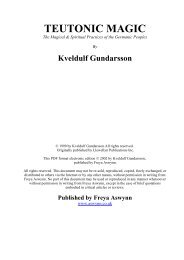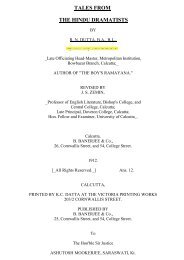Untitled - Awaken Video
Untitled - Awaken Video
Untitled - Awaken Video
Create successful ePaper yourself
Turn your PDF publications into a flip-book with our unique Google optimized e-Paper software.
Chapter 7. At the Well of Urð 193<br />
stage hands “behind the scenes” manipulating and rearranging the unseen. To be<br />
able to do so, however, they had to leave the stageof culture and society placing<br />
themselves in the same position as the outlaw or the “vargr.” They worked by a<br />
different set of rules than their communities of origin (which may have, incidently,<br />
included the phenomenon of the “berdache”). They worked unseen by normal eyes,<br />
in the world of dreams and visions, and, because of this they were not to be trusted.<br />
Óðínn, although chief of the Æsir, kept company with wolves–the most despised<br />
of animals, was an oath-breaker, was unfaithful to those who trusted in Him (including<br />
his wife), was a thief, a necromancer, traveled in disguise (a perverse behavior in<br />
a society where lineage and knowledge of lineage was important), was a liar, was able<br />
to murder by magic, and, generally, was not overly trusted by even those who put<br />
their faith in Him as a patron God. His behavior was often sociopathic and erratic<br />
not unlike descriptions of circumpolar shamans or Germanic or Celtic visionaries<br />
and saints. In spite of this, He was tolerated and revered, and even feared because<br />
of His knowledge and power to manipulate events. Such seemed to be the role of<br />
the northern wizard.<br />
“Drinking at Mímir’s Well,” if this position can be accepted, had to have been a<br />
loathsome choice of lifestyle for the Germanic peoples, requiring a sacrifice not many<br />
were willing to give: the sanctuary of community for the freedom of the outlaw, the<br />
love of relatives and friends for their fear and derision. The knowledge to which they<br />
had access, if Óðínn’s behaviors can be used as the prime example, often required<br />
the sacrifice of lives or engaging in behaviors which were often counter to those<br />
commonly deemed acceptable so to attain or strive for goals which were far beyond<br />
the scope of understanding for the average man. In Óðínn’s case, all odd behaviors<br />
such as those mentioned above, and, including the one which Loki accused Him of<br />
in “The Insolence of Loki,”<br />
“Be quiet, Óðínn! You never could<br />
decide a fight fairly.<br />
I know how often you have allowed<br />
the weaker man to win!” 36<br />
were all towards a single end: the staving off of the Ragnarök. He acted in such a way<br />
to prevent the early demise the Tree, and in so doing, there were necessary sacrifices<br />
along the way including His own son and His own eye. It almost seems that He was<br />
compelled or being driven by a force outside Himself towards the preservation of the<br />
76.<br />
36 Terry, Patricia The Poems of the Elder Edda (University of Pennsylvania Press) 1990, p.
















